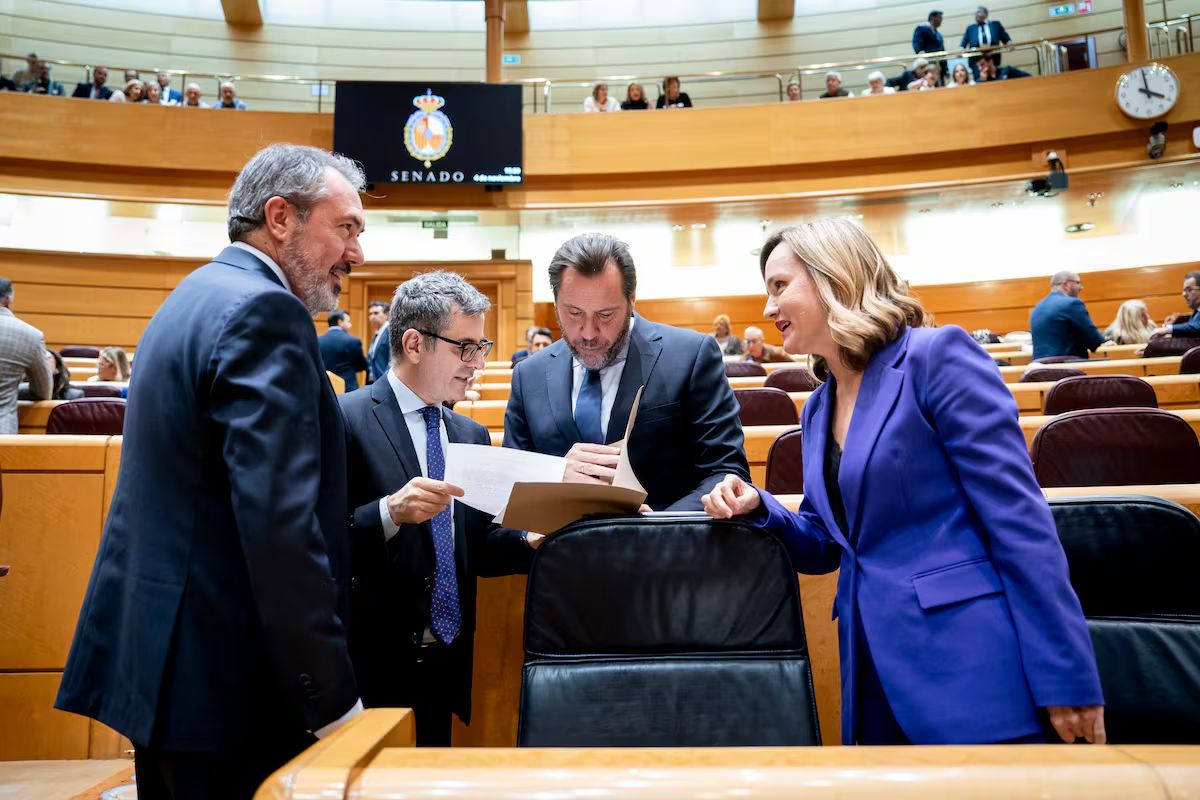
The Popular Party took advantage of its absolute majority in the Senate to approve the fourth reform of the House rules in two years. They did not have the consensus of the other parliamentary groups, who blamed them for this lack of agreement. All except Vox criticized the lack of a section expanding the use of co-official languages. The new regulation, approved in plenary session on Wednesday, provides a time limit for ministers in control sessions, which is not currently fixed, and paves the way for turning to the Constitutional Court to ask Congress to block legislative proposals leaving the Senate. Furthermore, from now on judges and magistrates will no longer have to attend the commissions of inquiry held in the Upper House.
All that remains is to publish the entry into force of the new code, presented last March, in the Official State Gazette (BOE). In this Wednesday’s plenary session, in which the reform was discussed, no senator mentioned in his speeches the new time limit for ministers, but from the entry into force of the reform they will have a maximum time of 40 minutes for their initial presentations and 15 and 10 minutes for responses. Nor was any reference made in the Chamber to the point of the reform which establishes that judges and magistrates do not have the obligation to attend commissions of inquiry.
Instead, the section of the new Regulations which aims to put an end to Congress’ blocking of legislative proposals approved in the Senate was discussed. The novelty is that when treatment is delayed “unjustifiably”, a conflict of powers can be proposed to the Plenary Session of the Upper House, which could end up before the Constitutional Court. In his turn, the popular spokesperson of the Rules Commission, Antonio Silvan, justified that “the Senate must modernize and recover its institutional weight”.
Silvan insisted that the reform is necessary because what the government does is “legislate by decree” and “disdain the Senate”. “This reform says enough,” he argued, “enough express decrees, Stop transforming parliamentarianism into a mere procedure and stop governments that escape control.” The leader of the Popular Party, Alberto Núñez Feijóo, announced a few weeks ago his intention to unblock the drafting of Senate laws that Congress was blocking, and for this reason he had to modify the Rules of Procedure. Now it will be possible.
Both the PSOE and the rest of the groups that participated in the debate showed their disagreement with the way in which the new rules were approved, i.e. without agreements and with an absolute majority. Socialist senator Manuel Fajardo reminded the PP that treatment must be “a matter of dialogue and consensus”, although they did not table any amendments. The PP senator reproached him for not having presented any amendment: “Amending does not mean accepting the reform but improving it”, he underlined.
Most groups submitted amendments to the new regulations, particularly groups representing territories with co-official languages, because they do not see greater representation of them in the new regulations. During the debate it emerged that there was clear disagreement on the use of these languages in the Upper House, with two clear positions.
Senators from Compromís, Esquerra Republicana, PNV, BNG, Junts, EH Bildu and the Confederal Left group argued that the use of co-official languages should be expanded. Now its use is limited to the presentation of memories, the debates of motions and the General Commission of the Autonomous Communities, but it is requested that it be extended to all parliamentary activity, as happens in the Congress. PNV Senator Estefanía Beltrán argued that “the absolute majority of the PP” “closes the door to Basque, Catalan and Galician” with this new regulation. Carmen da Silva, of the BNG, went further: “They practice a linguistic policy,” she launched.
On the other hand, Vox senator Angel Gordillo accused that “for decades there has been a growing persecution of Spaniards” in institutions. He argued that “the use of regional languages means depriving the majority of Spaniards of the immediate understanding of all the actions, measures and interventions that are reproduced in the Senate.” And that the use of co-official languages involves “enormous expenditure in material resources” such as earphones and translators.
The PP spokesperson responded to both positions. He criticized the fact that some groups have tabled amendments to, as he claims, “require the use of all official languages in every procedure, in every commission, in every document”. “They want to turn the Upper House into a Tower of Babel serving exclusively their history,” he said. This inflamed the Junts senator Juan Bagué, who did not understand that this presents itself “as a problem” and not as an “wealth”.
In his response to Vox, the popular senator disapproved of their attempt to “erase with one stroke of the pen any use of co-official languages in Spain.” Furthermore, he underlined that “the Senate approved three decades ago” the use of these languages “with a vote in favor of the PP”. “Once again the extremes coincide, some want to impose and others prohibit,” he concluded.
The recently approved reform provides for electronic voting for senators “for reasons of conciliation and health” and for situations in which the votes coincide with a plenary session of their autonomous parliament, as the PSOE had requested. But this does not satisfy the socialists. Its spokesman in the Senate, Juan Espadas, denounced that the PP did not count on “any other group” to carry out this legislative change and claims that for this reason it will be “questioned” by the Constitutional Court.





